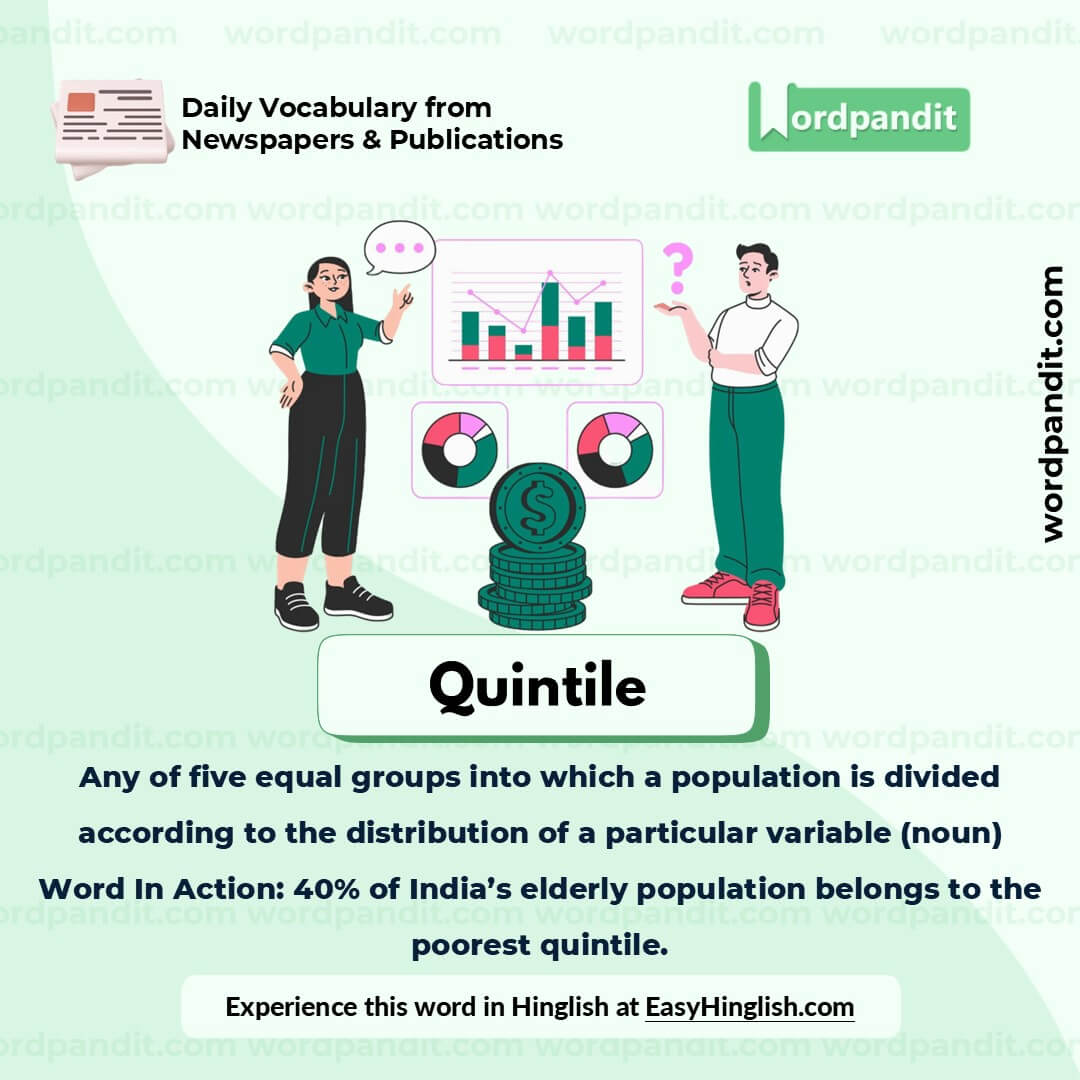Daily Vocabulary from Indian Newspapers and Publications
Welcome to Wordpandit’s Indian Vocabulary Hub
At Wordpandit, we understand the importance of staying rooted in the local context while expanding your language skills. This section focuses on enriching your vocabulary with words and phrases drawn from India’s leading newspapers and publications, ensuring you're learning vocabulary that is practical, relevant, and uniquely Indian.
Why Indian Sources Matter
We believe that the best way to master any language is by immersing yourself in local content. That’s why we carefully curate vocabulary from top Indian publications, including:
- The Hindu
- The Times of India
- The Economic Times
- Hindustan Times
- Live Mint
- The Indian Express
- And many others...
Stay Updated, Stay Relevant
With daily updates from Indian news sources, you’ll be consistently learning words that reflect the trends and shifts in Indian society and culture. Our focus is to provide vocabulary that enhances your understanding of the language in an Indian context.
How Wordpandit Supports Your Goals
Whether you’re preparing for exams, aiming to improve your professional communication, or simply want to stay connected with the latest Indian vocabulary, Wordpandit is here to guide you every step of the way.
Learn with a Practical Approach
Our interactive learning methodology includes real-world examples, engaging activities, and context-specific usage to ensure that every word becomes part of your active vocabulary.
Dive into Indian Vocabulary Today!
Why Choose Wordpandit?
Practical Learning: Focus on words you'll actually encounter in real-world reading, enhancing your comprehension and communication skills.
Diverse Content: From current affairs to scientific breakthroughs, our varied sources expose you to vocabulary across multiple domains.
Effortless Integration: Make Wordpandit a part of your daily routine. Just a few minutes each day can significantly boost your lexicon over time.
Your Path to Vocabulary Mastery
- Visit our Daily Vocabulary section regularly
- Explore new words and their usage in context
- Practice incorporating these words into your own writing and speech
- Track your progress as your vocabulary expands
Start Your Journey Today
Embark on your vocabulary enhancement journey with Wordpandit. By consistently engaging with our daily posts, you'll build a robust vocabulary that serves you well in academic, professional, and personal contexts.
Remember, a word a day keeps linguistic limitations at bay. Make Wordpandit your daily companion in the quest for vocabulary excellence!
WORD-1: Philanthropists
Context:
"helps attract international students, world-class faculty, and academic partners, philanthropists, and donors" - The Hindu
Explanatory Paragraph:
A philanthropist is someone who seeks to promote the welfare of others, usually by donating money to good causes. They are often associated with charity, giving back to society, and contributing to social progress.
Meaning: A person who seeks to promote the welfare of others, especially by donating money to good causes (noun)
Pronunciation: fi-LAN-thruh-pist
Difficulty Level: ⭐⭐⭐ (Intermediate)
Etymology: From Greek phil-anthropia meaning "love for mankind"
Synonyms & Antonyms:
Synonyms: benefactor, donor, humanitarian, patron
Antonyms: miser, self-seeker
Usage Examples:
- The philanthropist donated millions to support cancer research.
- Many philanthropists are dedicated to improving education in underdeveloped countries.
Cultural Reference:
Andrew Carnegie, a famous industrialist, was also a philanthropist, giving away much of his wealth to fund libraries, education, and peace initiatives.
Think About It:
What motivates people to become philanthropists, and how do their contributions impact society?
Quick Activity:
Identify a cause you care about and think of ways you could contribute, even if it's not through money.
Memory Tip:
Remember "philanthropist" as someone who "fills" needs in society with their generosity.
Real-World Application:
Many of today's wealthiest individuals, like Bill Gates, are philanthropists who use their resources to address global challenges.
WORD-2: Onerous
Context:
"the government no longer has the onerous responsibility of funding it" - The Hindu
Explanatory Paragraph:
Something is onerous when it involves a lot of effort and difficulty, often being burdensome or heavy to bear. It's a task or duty that is hard to accomplish or causes discomfort due to its demands.
Meaning: Involving a lot of effort and difficulty; burdensome (adjective)
Pronunciation: OH-nuh-ruhs
Difficulty Level: ⭐⭐⭐⭐ (Advanced)
Etymology: From Latin onerosus meaning "burden"
Synonyms & Antonyms:
Synonyms: burdensome, taxing, strenuous, arduous
Antonyms: easy, light, effortless, simple
Usage Examples:
- Fulfilling all the requirements for the project was an onerous task.
- The new regulations place an onerous burden on small businesses.
Cultural Reference:
"The cost of liberty is less than the price of repression." - W.E.B. Du Bois, referring to the onerous responsibilities of fighting for freedom.
Think About It:
What tasks in your life feel onerous, and how can you make them more manageable?
Quick Activity:
Think of a time when you faced an onerous task. Write down two ways you overcame it or lightened the load.
Memory Tip:
Connect "onerous" with "onus," which means a burden or responsibility.
Real-World Application:
The word "onerous" is often used in legal or professional settings to describe responsibilities that are heavy or difficult to fulfill.
WORD-3: Recuperating
Context:
"He is currently recuperating at a private hospital" - The Hindu
Explanatory Paragraph:
To recuperate means to recover from illness or exertion, regaining strength or health after being unwell. It's the process of getting back to a normal or healthy condition.
Meaning: Recover from illness or exertion (verb)
Pronunciation: re-KOO-puh-rayt
Difficulty Level: ⭐⭐ (Easy)
Etymology: From Latin recuperare meaning "recover"
Synonyms & Antonyms:
Synonyms: recover, heal, regain, improve
Antonyms: worsen, deteriorate, decline
Usage Examples:
- After surgery, she spent several weeks recuperating at home.
- The athlete is recuperating from a leg injury.
Cultural Reference:
Many famous athletes, like Serena Williams, have shared their recuperation journeys after injuries.
Think About It:
What steps can you take to make sure you recuperate quickly after exertion or stress?
Quick Activity:
Write down a daily habit that helps you recuperate from physical or mental stress.
Memory Tip:
Think of recuperating as "recovering" to help you remember its meaning.
Real-World Application:
Recuperating is often used in health contexts, especially after illness, surgery, or physical exertion.
WORD-4: Quintile
Context:
"40% of India’s elderly population belongs to the poorest quintile" - The Hindu
Explanatory Paragraph:
A quintile refers to any one of five equal groups that a population or dataset is divided into, especially in terms of statistics or income. The term is often used to describe social or economic standings, where the population is divided into five categories from the lowest to the highest.
Meaning: Any of five equal groups into which a population is divided according to the distribution of a particular variable (noun)
Pronunciation: KWIN-tyl
Difficulty Level: ⭐⭐⭐ (Intermediate)
Etymology: From Latin quintus meaning "fifth"
Synonyms & Antonyms:
Synonyms: percentile, decile
Antonyms: none
Usage Examples:
- The top quintile of earners pays the majority of income taxes in the country.
- Students from the lowest quintile often have less access to educational resources.
Cultural Reference:
The concept of quintiles is commonly used in economics to analyze income inequality and distribution of wealth.
Think About It:
How does being part of a particular quintile affect one's access to resources and opportunities?
Quick Activity:
Imagine a population divided into quintiles based on income. What challenges might people in the lowest quintile face compared to those in the highest?
Memory Tip:
Remember "quintile" by associating it with "quintuple" (five) and dividing into five equal parts.
Real-World Application:
The term "quintile" is often used in socioeconomic studies to understand inequality, wealth distribution, and education levels.
WORD-5: Multifaceted
Context:
"PhD admissions should value creativity and the ability to contribute to the complex, multifaceted world of academic research" - The Hindu
Explanatory Paragraph:
When something is multifaceted, it has many different aspects, sides, or features. It is used to describe situations, systems, or issues that are complex and involve many different factors or perspectives.
Meaning: Having many different aspects or sides (adjective)
Pronunciation: muhl-tee-FAS-it-id
Difficulty Level: ⭐⭐⭐ (Intermediate)
Etymology: From Latin multus meaning "many" and facetus meaning "face or side"
Synonyms & Antonyms:
Synonyms: diverse, versatile, complex, multidimensional
Antonyms: simple, one-dimensional, uniform
Usage Examples:
- The company’s multifaceted approach to solving the problem impressed the investors.
- As a leader, she is known for her multifaceted skill set, which includes strategy, communication, and empathy.
Cultural Reference:
In art and design, a multifaceted diamond is valued for its complexity and the way its many faces reflect light beautifully.
Think About It:
How does embracing a multifaceted approach help in solving complex global problems?
Quick Activity:
Identify a multifaceted issue in your life or society, and list at least three different aspects that contribute to its complexity.
Memory Tip:
Think of a "multifaceted" gem with many faces, representing multiple sides of a situation.
Real-World Application:
The word "multifaceted" is often used in academic, professional, and creative fields to describe solutions, people, or systems that are diverse and complex.


















